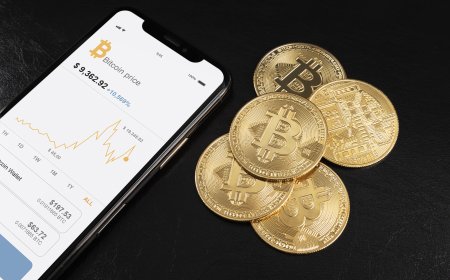Is Bitcoin Really Anonymous? Exploring BTC and Privacy Coins

When Bitcoin was first introduced, many believed it offered complete anonymitya way to send and receive money without being tracked. Over time, however, it became clear that Bitcoin is pseudonymous, not truly anonymous. While your name isn't tied to your Bitcoin wallet, every transaction is recorded publicly on the blockchain. This transparency, while great for security and traceability, makes Bitcoin less private than some users might think.
As privacy concerns grow, especially in 2025 where surveillance and data breaches are on the rise, more users are turning to privacy coins and enhanced tools to protect their financial data. In this article, well explore how anonymous Bitcoin really is, how privacy coins differ, and how choosing the best bitcoin wallet or a trusted cryptocurrency wallet can improve your privacy without sacrificing usability.
Bitcoins Privacy: Myth vs. Reality
Bitcoin operates on a public ledger called the blockchain. Every transaction, wallet address, and amount sent is visible to anyone. Although your name isn't directly attached, blockchain analytics firms and even governments can often link wallet addresses to real-world identities using KYC data, IP addresses, or behavioral patterns.
What Bitcoin Does Offer:
-
No need to link your name to an address by default
-
Peer-to-peer transfers without intermediaries
-
Open-source tools that allow private custody
What Bitcoin Doesnt Offer:
-
Complete transaction anonymity
-
Obfuscation of addresses and balances
-
On-chain privacy by default
Because of this, users who seek greater privacy must go the extra mile by using specific wallets, privacy tools, or alternative cryptocurrencies.
How Can You Enhance Bitcoin Privacy?
Even though Bitcoin isnt anonymous by default, there are several methods to improve privacy:
1. Use a Trusted Cryptocurrency Wallet With Privacy Features
Choosing a trusted cryptocurrency wallet that includes privacy-focused tools is one of the best ways to stay secure. Look for features like:
-
Tor support or IP masking
-
Coin control and address labeling
-
Segregated addresses (avoid address reuse)
-
Support for CoinJoin (a mixing method that obscures transaction origins)
Examples:
-
Wasabi Wallet Known for its CoinJoin integration
-
Samourai Wallet Includes stealth addresses, Whirlpool mixing, and offline pairing
-
BlueWallet Simple UI with advanced privacy options
A trusted cryptocurrency wallet not only keeps your funds safe but also helps reduce your on-chain footprint.
2. Avoid Reusing Addresses
Each time you receive Bitcoin, use a new address. Reusing addresses makes it easier to link multiple transactions to one identity.
3. Use Mixing or CoinJoin Services
Mixing services combine multiple transactions from different users, making it harder to trace the origin of funds. CoinJoin is the most popular decentralized method.
4. Transact on Layer 2 (Lightning Network)
The Lightning Network is a second-layer solution for faster and cheaper BTC transactions. It adds a level of privacy because transactions arent recorded individually on the Bitcoin blockchain.
Privacy Coins: The Alternative to BTC?
Because of Bitcoins transparency, several privacy coins have emerged, designed to offer true anonymity from the ground up.
Top Privacy Coins in 2025:
-
Monero (XMR): Uses stealth addresses, RingCT, and full chain obfuscation
-
Zcash (ZEC): Offers optional shielded transactions using zk-SNARKs
-
Dash (DASH): Includes PrivateSend, a CoinJoin-based feature
-
Firo (FIRO): Combines Lelantus protocol with privacy innovations
These coins are built with privacy as the default, meaning their blockchain doesn't publicly expose sender/receiver addresses or amounts. However, they come with trade-offs such as limited exchange support or increased regulatory scrutiny.
The Role of the Best Bitcoin Wallet
If you want to stick with Bitcoin but value privacy, using the best bitcoin wallet is essential. The right wallet will:
-
Allow you to manage multiple addresses easily
-
Let you control UTXOs and minimize linkability
-
Support privacy protocols like CoinJoin or Lightning
-
Help you back up and restore your funds securely
In 2025, some of the best bitcoin wallet options for privacy-conscious users include:
-
Samourai Wallet (Android)
-
Wasabi Wallet (Desktop)
-
BlueWallet (iOS/Android)
-
Electrum (Desktop with advanced settings)
For general users who want a balance between security, privacy, and usability, Plus Wallet also supports BTC along with multi-chain functionality and non-custodial control, making it a top contender in the trusted cryptocurrency wallet category.
Bitcoin vs Privacy Coins: Which Is Better for Privacy?
| Feature | Bitcoin | Monero | Zcash | Samourai Wallet |
|---|---|---|---|---|
| Public Ledger | Yes | No | Optional | Yes |
| Default Privacy | No | Yes | Partial | No |
| Coin Mixing Available | Yes (via CoinJoin) | Built-in | Optional | Yes (Whirlpool) |
| Exchange Compatibility | High | Medium | Medium | High |
If privacy is your top priority, Monero or Zcash might be more suitable. However, if you prefer Bitcoins liquidity and ecosystem, using privacy-enhancing tools and the best bitcoin wallet can go a long way in safeguarding your activity.
Final Thoughts
Bitcoin is not inherently anonymous, but with the right tools, you can enhance your privacy while still benefiting from its security and global acceptance. Using a trusted cryptocurrency wallet with advanced features, avoiding common mistakes like address reuse, and leveraging technologies like CoinJoin or Lightning Network can help you remain private in an increasingly transparent digital world.
For users who demand full anonymity, privacy coins like Monero or Zcash may be the better choice. But for most, a privacy-focused best bitcoin wallet offers a strong balance between privacy, usability, and decentralization.
Whether you're a privacy advocate, a cautious investor, or just someone who values financial autonomy, protecting your identity starts with how you choose to store and use your crypto.
































